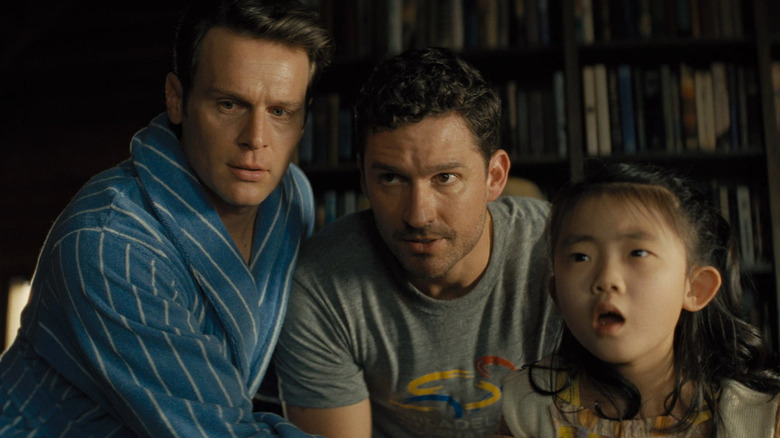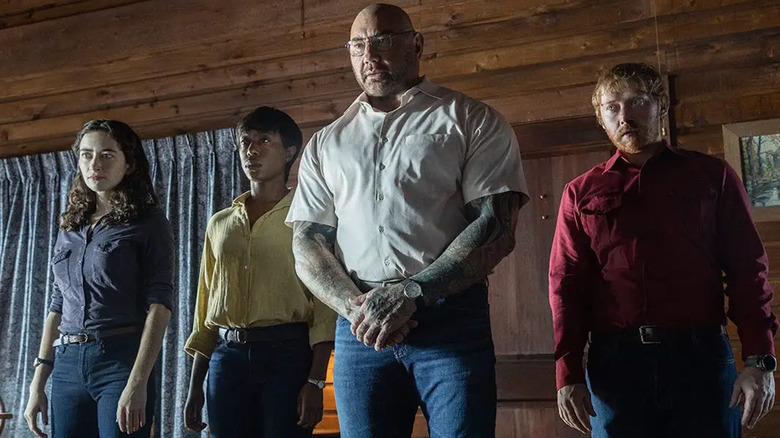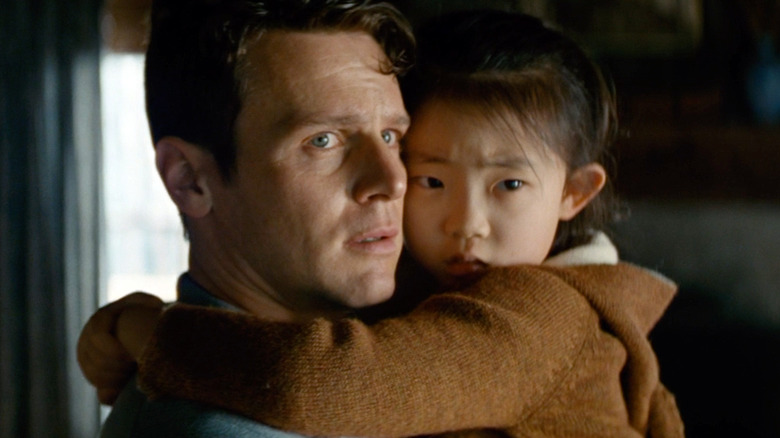
This article contains spoilers about "Knock at the Cabin."
We all know that there's no such thing as a 1:1 adaptation. Even something like Zack Snyder's "Watchmen," which brings exact panels to life complete with the original comic book dialogue, futzed with the ending. There are still some comic book fans who are angry about the lack of giant squid to this very day.
It's to be expected that any adaptation is going to come with some changes. Reading a book is different from watching a movie, after all, and a good screenwriter will know when to change things up for a visual storytelling medium and when the original text had it right. Steve Desmond, Michael Sherman, and M. Night Shyamalan's take on Paul Tremblay's "The Cabin at the End of the World" is very faithful ... until it isn't. And then it very much changes the core concept at the center of Tremblay's story.
We can argue all day which is better, the author keeping the apocalyptic threat ambiguous or the film's definitive answers to whether or not the world is on the brink of disaster, and I certainly have my personal preference, but what does the author himself think of the changes? For one, he thinks the ending Shyamalan and his co-writers came up with is actually way darker than his own and that's saying something considering the movie keeps a key character alive that Tremblay offs about halfway through the book.
Book Vs. Movie

Obviously, we're going to have to talk about some ending details, so here's your second spoiler warning. Don't read if you haven't seen the movie yet!
In the book, the young daughter, Wen, is accidentally killed during a struggle with a gun leaving just her grieving two dads to figure out if the hostage takers are right that the world is ending unless they make the conscious choice to kill one or the other. Wen doesn't count, you see, because it wasn't a willing sacrifice. They ultimately choose that whatever life looks like after their experience at the cabin. Apocalypse or not, they're going to face it together and we never know if the world ends or not.
The ambiguity is kind of the point of the book, which is mostly a battle of wills between the logical victims and the creepy intruders who fully believe they're there for the best of mankind, but let's be honest ... they give off super culty vibes. The movie throws out that ambiguity and definitively answers the question of whether or not these intruders are the Four Horsemen of the Apocalypse by having the protagonists make the sacrifice to appease whatever angry god is forcing this scenario and leaving the other to raise their daughter in the now-saved world.
Shyamalan's Ending Is Actually Darker Than The Book's Ending

In an interview with the Los Angeles Times, Tremblay commented on how fascinated he was by just how bleak that ending is once you fully examine it.
"I think the movie's ending is way darker than my book. I don't mean to say this flippantly. But politics aside, on a character level, the idea of, 'What are Andrew and Wen going to do now?' Not only did they just kill Eric — how will they go on after with that knowledge? — but also with the knowledge that this supreme being that controls the universe was so unremittingly cruel to them? I would never write a sequel to 'The Cabin at the End of the World,' but I'm actually weirdly interested in a story of what Wen and Andrew do now."
That's an interesting read. Sure, the world is saved, but if this is what has to happen every so often to keep mankind from being wiped off the face of the Earth, then what kind of Mad God are we at the whim of? And, as Tremblay posits, how does the knowledge of such a being torment the survivors for the rest of their days?
We'll save the argument over which ending is better, the definitive one or the ambiguous one, for another time, but it is very interesting that the author was so intrigued by the darker implications of what on the surface is the happier of the two endings.
Read this next: Jordan Peele's Most Brutal Movie Moments Ranked
The post Author Paul Tremblay Thinks M. Night Shyamalan's Knock at the Cabin Ending is Way Darker Than His Novel appeared first on /Film.
0 Commentaires